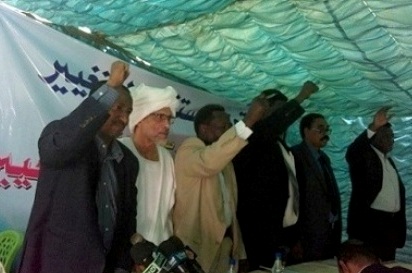Relations with Sudan’s armed groups trigger FFC split
October 28, 2016 (KHARTOUM) – Nearly nice months since its inception, the opposition alliance Future Forces For Changes (FFC) has split over the relation with the armed groups.

In turn, the leader of the far-right JPF, on Wednesday, released a statement announcing Attabani’s eviction from the FFC leadership and appointed Mustafa a new chairman of the heterogeneous coalition which includes Islamist and liberal groups.
Publicly the participation of Mustafa’s faction in the National Dialogue Conference earlier this October triggered his dismissal from the FFC. Attabani and his faction believe that nothing has changed and the government should implement the confidence building measures provided in the African Union Roadmap Agreement before to join the internal process.
Also, Attabani’s faction considers that striking a deal over the humanitarian cessation of hostilities and organization of an inclusive preparatory meeting, remain necessary steps towards an inclusive process to end war and achieve democratic reforms in Sudan.
But the JPF leader who campaigned for the separation of South Sudan, had kept his hostility unaltered towards the armed groups, particularly the Sudan People’s Liberation Movement-North (SPLM-N).
Reached by Sudan Tribune to comment on the split, FFC Media Official Ussama Tawfiq said Mustafa’s presence among the FFC components was a hindrance to the establishment of relations with the armed groups.
Tawfiq further said that now the FFC groups led by Attabani will develop its relations with the armed groups, pointing to the good relations between him and the African Union High Level Implementation Panel (AUHIP) which mediates the negotiations.
“The issue of al-Tayeb Mustafa is over now. The purpose of the statement that we issued was to drop his membership alone but the door remains open for the others (who followed him),” he stressed.
On the other hand Nagi al-Karbashi, from the FFC Mustafa-faction, admitted that the Sudan Call forces remained unwilling to develop its relations with the FFC because of the presence of JPF in the coalition.
“Attabani and his faction are seeking to please the Sudan Call alliance unlike Mustafa who seeks to resolve Sudan problems regardless the satisfaction or rejection of the armed movements,” Karbashi said.
He further said that JFP’s hostile position to the “New Sudan” project makes it difficult for the Sudan Call to accept to accept the FFP; confirming that the FFC more than once tried in vain to establish a channel of coordination with the alliance of the armed groups and main opposition parties.
On Saturday 8 October, Presidential Assistant Ibrahim Mahmoud Hamid and FFC Deputy Chairman Abdel Gadir Ibrahim Ali signed a framework agreement titled “Areas for an agreement on cooperation and solidarity’’ providing the two sides will discuss “joint political initiatives to promote the dialogue, especially those relating to the participation of any other political force”.
Further, the National Dialogue Secretariat announced that the FFC would take part in the National Dialogue Conference.
Following these developments, the Liberal Democratic Party (LDP), led by Mayada Soar al-Dahab, announced 24 hours later its withdrawal from the FFC coalition to protest this rapprochement with the NCP led process.
Tawfiq explained to Sudan Tribune that Mustafa who is the uncle of President Omer al-Bashir expressed his “sweeping desire” to join a national dialogue. He said that this move was supported by FFC members who were part of the regime adding it would “allow them to return to the power from the gate of the national dialogue”.
He added that Mustafa threw the eight-point agreement with the dialogue mechanism ahead of the dialogue conference on October 10, and took part on behalf of the FFC at the dialogue meetings without negotiating the implementation of the eight points related to African Union Roadmap.
However, Karbashi defended the position of his faction, claiming that the mechanism “7 +7” agreed to all the terms of the eight-point memorandum of understanding, including the inclusion of the FCC in the dialogue process.
“So the FFC has no option except to participate in the national dialogue to address the issues of Sudan : ending war and achieve peace,” he said.
Attabani and Mustafa pulled out of the national dialogue process last year, calling for the implementation of a road map the African Union endorsed in September 2014 for peace and constitutional dialogue.
Following what, they launched the FFC in Khartoum on 23 February 2016.
(ST)
